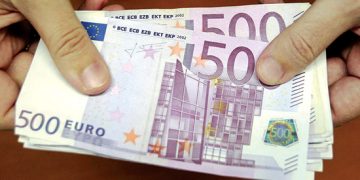Gulf Today
The fall of euro exchange rate below that of the American dollar tells a bigger story than that of competing currencies. Both the British pound and the euro have generally traded higher in comparison to the dollar, and it reflected that the European and the British economy were functioning at more efficient levels than the American.
The slide in euro against the dollar reveals the state of the European economy in the shadow of the Russia-Ukraine war. The inflation level in the euro area (EA) is 8.6 per cent, but it is not a uniform rate of inflation across Europe, with smaller countries experiencing higher rates of inflation, with inflation rate in Estonia at 26 per cent.
The inflation in Europe is a result of the Russia-Ukraine war, and the European and American economic sanctions against Russia.
This has sent the fuel and gas prices soaring high, and in turn fuelling inflation. Though it is the United States that has led the campaign for imposing sanctions against Russia, the higher fuel prices did not have a direct impact in the United States as it has in Europe.
At the same time, the Federal Reserve has been raising interest rates quite aggressively this year to fight raging inflation in the United States.
The European Central Bank (ECB) is set to raise the rates to check inflation, but it will be modest compared to that of the Federal Reserve. It is the rising interest rates in the United States that is pulling investors away from Europe and to the United States.
There is also the argument that a cheaper euro could help boost European exports, but this would benefit only larger and stronger economies like Germany and France.
It is indeed the case that Europe unlike America still depends on export of manufactured goods, especially at the higher end of industrial manufacturing though Europe is as much dependent on Chinese intermediate goods. The immediate challenge before the ECB and the euro area (EA) economies is that of checking inflation and avoid recession.
Lucio Sarno, professor of finance at Cambridge University said, “The increasing interest rates in the US attracts further investment in dollar assets, and this is in addition to the strong demand for dollar driven by its safe haven status at times of war.” Though the US has been aggressive about supporting Ukraine and opposing Russia, the price for this policy is being paid directly by the European countries than by the US.
Sarno has also explained the problem of the falling euro: “Ultimately, the fall in the euro is making the problem of inflation even worse than it already is by importing further inflation because of the weak euro; about half of imported goods in the euro zone are invoiced in dollar, so the pass-through to weak euro from high inflation is inevitable as more euros are needed to pay for those imported goods.”
Excepting Germany, all the major economies like that of France, Italy, and the eastern European countries are facing growth problems, issues of cost of living, unemployment. And most of the European countries benefited hugely from the oil and gas supplies from Russia, and now they are forced to look for alternatives.
The economic sanctions in the wake of the war in Ukraine have affected Russian economy, but Russia’s European neighbours are paying a price too.
The common currency and the unified market in Europe were expected to create a huge domestic market. But it does not seem to have happened.
Each of the countries in the euro area is experiencing economic pain on its own, and the European Union (EU) does not offer any cushion to tide over crises like the one about a weak euro.





